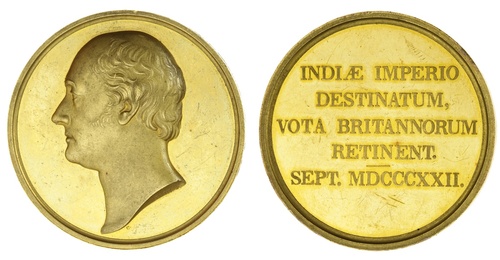
Auction: 19025 - Ancient, Indian and Islamic, British and Foreign Coins and Commemorative Medals
Lot: 1236
George Canning MP, Appointment as Foreign Secretary, Gold Medal, 1822, by W Bain, bare head left, signature on truncation, rev.
In April 1822, Canning accepted the post of Governor-General of India, which carried with it an annual salary of £25,000. However in August, following the suicide of his long standing rival Lord Castlereagh after questions about his sexuality surfaced, Canning accepted the post of Foreign Secretary, having previously served in this position during the Portland administration of 1807-09.
During this Cabinet, Canning successfully directed the seizure of the Danish fleet, thereby further cementing British naval supremacy over Napoleon. However his Foreign Office came to be in open conflict with Castlereigh's War Office, a matter only settled with a customary duel, in which Canning was wounded in the thigh. Upon Portland's death, Canning proffered the King to become Prime Minister but resigned from Government when this was refused.
After the assassination of Spencer Perceval in May 1812, another individual under whom Canning refused to serve, he succeeded in carrying a motion in favour of Catholic emancipation, but again turned down a Cabinet position as it now meant serving under Castlereagh, then leader of the House of Commons. After a brief stint as ambassador to Lisbon, Canning's political life was relatively quiet until March 1820, when he again resigned this time from the Board of Trade in protest at proceedings against Queen Caroline, whom Canning considered a close personal friend.
During his second tenure as Foreign Secretary, Canning was a proponent of Greek autonomy and independence for colonies in Spanish America, as well as being a staunch abolitionist. This view won him admiration from contemporary William Wilberforce (see lot 1234), who applauded Canning's stance on devolution as a viable means to obtaining the abolition of the slave trade in Spanish and Portuguese held territories.
Subject to 20% VAT on Buyer’s Premium. For more information please view Terms and Conditions for Buyers.
Sold for
£4,000




